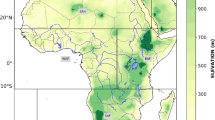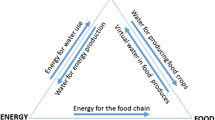Abstract
Britain, a nation with the most organized water system in the world, suffered a protracted drought in 1975–1976. This paper casts doubt on the assumption that its causes were natural, especially in rural areas, and presents some general principles regarding the process of responding to water supply problems. The past and present water situation of Britain is described, and an account of the course of the drought and responses to it is presented.
Similar content being viewed by others
References
Baldwin, A. (1977). Give us this day...The Geographical Magazine 49 (8): 498–501.
Bateson, G. (1972a). The role of somatic change in evolution. InSteps to an Ecology of Mind, Ballantine, New York, pp. 346–363.
Bateson, G. (1972b). Ecology and flexibility in urban civilization. InSteps to an Ecology of Mind, Ballantine, New York, pp. 494–504.
Baumann, D. D., and Kates, R. W. (1972). Risk from nature in the city. InUrbanization and the Environment, Detwyler, T. R., and Marcus, M. G. (eds.), Duxbury, Belmont, Calif., pp. 1969–194.
Best, G. (1972).Mid-Victorian Britain: 1851–1975. Schocken, Boston.
Briggs, A. (1970).Victorian Cities. Harper and Row, New York.
Brooks, C. E. P., and Glasspoole, J. (1928).British Floods and Droughts. Ernest Benn, London.
Burton, I., and Kewitt, K. (1974). Ecological dimensions of environmental hazards. InHuman Ecology, F. Sargent (ed.), North Holland, Amsterdam, pp. 253–283.
Burton, I., and Kates, R. W. (1964). The perception of natural hazards in resource management,Natural Resources Journal 3: 412–441.
Burton, I., Kates, R. W., and White, G. (1978).The Environment as Hazard. Oxford University Press, New York.
Calder, A. (1969).The People's War: Britain 1939–1945. Pantheon, New York.
Central Statistical Office (United Kingdom) (1979).Monthly Digest of Statistics, February, 1979. H.M.S.O., London.
Court, W. H. B. (1967).A Concise Economic History of Britain from 1750 to Recent Times. Cambridge University Press, Cambridge.
Haddon, W. L. (1970). On the escape of tigers: An ecologic note.Technology Review 72(7): 44–53.
Hall, N. (1975). The myth of the natural disaster.The Ecologist 5(10): 368–371.
Hanna, L. W. (1973). Environment and land use. InThe UK Space: Resources, Environment, and the Future, J. W. House (ed.), Weidenfeld and Nicolson, London, pp. 164–218.
Havlick, S. W. (1974).The Urban Organism. MacMillan, New York.
Hobsbawm, E. J. (1969).Industry and Empire. Pelican, Harmondsworth.
Hogg, W. H. (1969). Estimates of long-term irrigation needs. InThe Role of Water in Agriculture, J. A. Taylor (ed.), Pergamon, Oxford, pp. 171–184.
Holloway, S. (1977). Londoners may soon be living on a vast reservoir.London Press Service, March 1977.
Howe, C. W., and Linaweaver, F. P. (1967). The impact of price on residential water demand in its relation to system demand and price structure.Water Resources Research 3(1): 13–22.
Kropotkin, P. (1899).Fields, Factories, and Workshops. G. P. Putnam, New York.
Lawton, R. (1973). People and work. InThe UK Space: Resources, Environment and the Future, J. W. House. Weidenfield and Nicolson, London, pp. 75–163.
Kargerison, T. (1976). No need for drought.New Scientist, 71(1014): 374–376.
Martin, D. S. (1971). Britain's dying chalk streams.The Ecologist 1(10). Ministry of Agriculture, Fisheries, and Food (1967).Water for Irrigation, Supply and Storage. Bull. No. 202, H.M.S.O., London.
Morren, G. E. B. (1977). From hunting to herding: Pigs and the control of energy in montane New Guinea. InSubsistence and Survival: Rural Ecology in the Pacific, T. Bayliss-Smith and R. Feachem (eds.), Academic Press, London and New York, pp. 273–315.
Mumford, L. (1956). The natural history of urbanization. InMan's Role in Changing the Face of the Earth, W. L. Thomas (ed.), University of Chicago Press, Chicago, pp. 382–398.
Mumford, L. (1961).The City in History. Harcourt, Brace, and World, New York.
National Water Council (1976).We Didn't Wait For The Rain. H.M.S.O., London.
National Water Council (1977).Annual Reports and Accounts, 1976/77. H.M.S.O., London.
Peak, W. (1977). Institutionalized inefficiency: The unfortunate structure of Colorado's water resource management system.Water Resources Bulletin, 13(3): 551–562.
Prickett, C. N. (1969). The current trends in the use of water in agriculture. InThe Role of Water in Agriculture, J. D. Taylor (ed.), Pergamon, Oxford, pp. 101–119.
Slobodkin, L. B. (1968). Toward a predictive theory of evolution. InPopulation Biology and Evolution, R. C. Lewontin (ed.), Syracuse University Press, Syracuse.
Vayda, A. P. (1974). Warfare in ecological perspective.Annual Review of Ecology and Systematics 5: 183–193.
Vayda, A. P., and McCay, B. J. (1975). New directions in ecology and ecological anthropology.Annual Review of Anthropology 4: 293–306.
Vayda, A. P., and McCay, B. J. (1977). Problems in the identification of environmental problems. InSubsistence and Survival: Rural Ecology in the Pacific, T. Bayliss-Smith and R. Feachem (eds.), Academic Press, London and New York, pp. 411–418.
Waddell, E. (1975). How the Enga cope with frost: Responses to climatic perturbations in the Central Highlands of New Guinea.Human Ecology 3(4): 249–273.
Waddell, E. (1977). The hazards of scientism: A review article.Human Ecology 5(1): 69–76.
Welsh Office and Department of Environment (United Kingdom) (1977).The Water Industry of England and Wales, the Next Steps. H.M.S.O., London.
White, G. (ed.) (1974).Natural Hazards: Local, National, Global. Oxford University Press, New York.
White, G. F. (1978). Comment on Waddell: “The hazards of scientism.”Human Ecology 6(2): 229–231.
Wisner, B., Westgate, K., and O'Keefe, P. (1976). Poverty and disaster.New Society 9 September: 546–548.
Wittfogel, K. A. (1957).Oriental Despotism: A Study of Total Power. Yale University Press, New Haven.
Author information
Authors and Affiliations
Additional information
The author gratefully acknowledges the critical comments of Ken Hewitt, A. P. Vayda, Bonnie McCay, and Bill Torre on various drafts and sections of this paper.
Rights and permissions
About this article
Cite this article
Morren, G.E.B. The rural ecology of the British drought of 1975–1976. Hum Ecol 8, 33–63 (1980). https://doi.org/10.1007/BF01531467
Issue Date:
DOI: https://doi.org/10.1007/BF01531467




